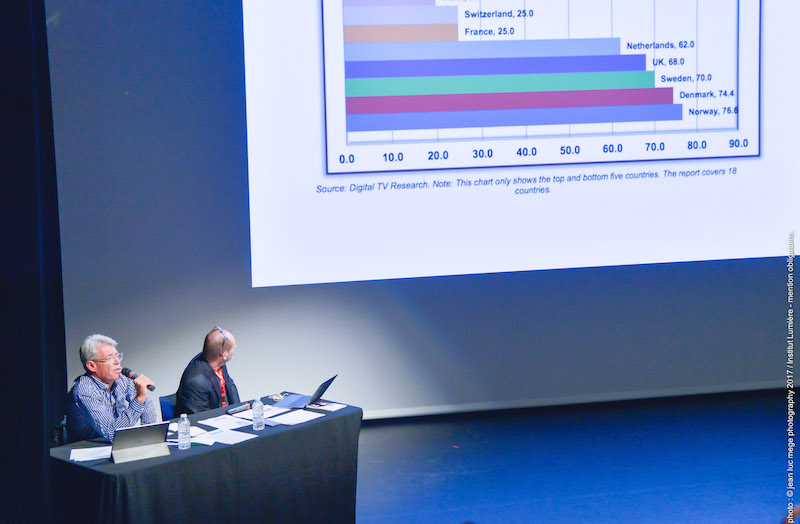Keynote of the great witness : "Without SVoD, no salvation"
With Pascal Lechevallier, Jérôme Soulet, director of the Video, Television and New Media department at Gaumont., delivered his views on the future challenges of heritage cinema.

Through ten graphs, Jérôme Soulet has made a portrait of the current affairs in the consumption of repertory films and even anticipated their future. And the sentence is without appeal for the Grand Witness: it is necessary for the industry to adapt as quickly as possible to new uses.
And yet, for now, the physical video is still pretty good, always remaining the first access medium for the cinema: "Do not bury it too fast, it still represents three times the offer available in SVoD" . And to those who would think that television channels do not make enough efforts for heritage cinema, Jérôme Soulet insists: "60% of the films broadcast on television are of heritage (being more than 10 years ), and 1/4 of them are even more than 40 years old,"he said. According to him, the channels do their job and if they do not broadcast Fellini’s or Bergman’s at prime time, it is that it is simply not their economic model: "They walk on advertising and the public wants comedy, that's why most of the films that have been broadcast the most for the last 50 years are comedies, and the first 27 are French!"
After this finding finally away from an ambient alarmism, things got bodied looking towards the future. Indeed, according to the great witness, two worlds are confronting: the linearized and the delinearized. And it is the 2nd who prevails. Except that France is behind catching up compared to its foreign colleagues. "The French market is not going in the right direction with a lack of SVoD offers," he insists, adding that if the trend does not reverse, it may be problematic in the future for repertoire cinema: "Without SVoD, no salvation". "In 2020, half of the world's video consumption will be on demand," he argues, with figures. And according to him and Pascal Lechevallier, a whole generation, the Millenials and Digitale Natives, are already more than 60% of users of these new technologies. A transition that leads to behaviors such as the Mobile Only, the younger generations having access to images only through their mobile phone, thus raising the question of the transmission of the heritage.
Added to this change in consumption are other related problems, such as concerns about territoriality and the decline in the advertising market for more traditional broadcasting methods. "In the United States, the SVOD market alone has surpassed the others and this is what we are heading towards, but instead of fearing this transformation, we must understand it and see it as an opportunity," says Jérôme Soulet . Especially when it comes to heritage film specifically: its theatrical release, for example, represents only a very small part of all entries (ie 1%), with a few exceptions. And knowing that these repertory films suffer from a great under-representation in the big international VoD or SVoD actors, the great witness thinks that there is a playing card to use locally, citing initiatives such as FilmoTV or LaCinétek: "As French rights-holders, we have to support the digital projects in France".
Jérôme Soulet concluded his speech on the prospect of the need for digital switch-over and wishing, in the sense of the AVSM Directive, to compel large international platforms to quotas for European films.




